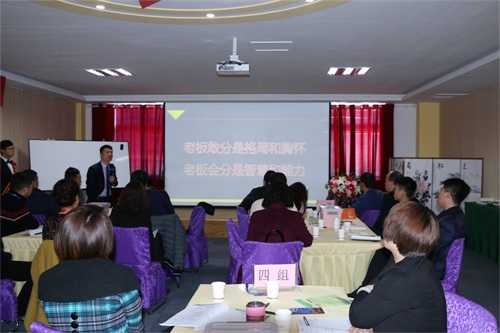常見的合伙人機制分類情況如下:
The common classification of partner mechanisms is as follows:
①商業(yè)合伙
① Business partnership
這種機制側(cè)重于項目合作,一般股權(quán)集中,、業(yè)務(wù)集中,,可以沒有實物投究適用于絕大多數(shù)的創(chuàng)業(yè)團隊。其優(yōu)點是商業(yè)性強,,規(guī)則清晰,,適合早期創(chuàng)業(yè);缺點是過于看重利益,行為往往具有短期效應(yīng),。
This mechanism focuses on project cooperation, with generally concentrated equity and business, and can be applied to the vast majority of entrepreneurial teams without physical investment. Its advantages are strong commercialization, clear rules, and suitable for early entrepreneurship; The disadvantage is that it places too much emphasis on benefits, and behavior often has short-term effects.
②事業(yè)合伙
② Business partnership
這種機制側(cè)重于行業(yè)應(yīng)用,,一般股權(quán)相對分散,業(yè)務(wù)決策更加民主,。優(yōu)點是執(zhí)行力強,,有很強的環(huán)境適應(yīng)性。缺點是對個人視野和格局要求較高,,存在個人能力“瓶頸”,。代表企業(yè)如新東方、萬科等,。
This mechanism focuses on industry applications, with relatively dispersed equity and more democratic business decision-making. The advantage is strong execution ability and strong environmental adaptability. The disadvantage is that there is a high demand for personal vision and pattern, and there is a bottleneck in personal abilities. Representative enterprises such as New Oriental and Vanke.
③價值合伙
③ Value Partnership
這種機制側(cè)重于產(chǎn)業(yè)應(yīng)用,,一般股權(quán)更加均衡,業(yè)務(wù)決策也更加具有理性,。其優(yōu)點是生命力強,,有戰(zhàn)略預(yù)見性。不足是對產(chǎn)業(yè)認識,、戰(zhàn)略,、運營和文化管理的要求比較高。這三種類型的合伙機制,,代表的也是企業(yè)在不同發(fā)展階段的演進模式,,相互之間在本質(zhì)上沒有嚴格的區(qū)分,核心要素都是強調(diào)團隊和個人在企業(yè)發(fā)展中的重要性,,只是在不同的發(fā)展階段其側(cè)重點不同而已,。
This mechanism focuses on industrial applications, with generally more balanced equity and more rational business decisions. Its advantages are strong vitality and strategic foresight. The disadvantage is that there are relatively high requirements for industry understanding, strategy, operation, and cultural management. These three types of partnership mechanisms represent the evolution patterns of enterprises at different stages of development, and there is no strict distinction between them in essence. The core elements all emphasize the importance of teams and individuals in the development of the enterprise, but their focus is different at different stages of development.
(2)初創(chuàng)企業(yè)的合伙機制需要關(guān)注的核心問題
(2) The core issues that need to be addressed in the partnership mechanism of start-up enterprises
對于大多數(shù)創(chuàng)業(yè)企業(yè)來說,采用商業(yè)合伙模式時,,要充分關(guān)注的問題如下:
For most startups, when adopting the business partnership model, the following issues should be fully addressed:
①要有明確的規(guī)則
① There should be clear rules
當今企業(yè)之間的競爭,,核心就是制度的競爭,、機制的競爭。初創(chuàng)公司往往面臨資金,、人力,、市場等各種現(xiàn)實問題,企業(yè)也很容易將精力集中在處理這些問題上面,,而對本身的制度建設(shè)重視程度不足,。
The core of competition among enterprises today is the competition of systems and mechanisms. Startups often face various practical problems such as funding, manpower, and market, and companies are also prone to focusing their efforts on addressing these issues, with insufficient emphasis on their own institutional development.
山東股權(quán)合伙公司認為,企業(yè)的制度建設(shè)是與發(fā)展需求密切匹配的,,也可以認為是企業(yè)在某個特定時期對已有做法的固化以及適度超前的預(yù)期要求,。因此,制度是企業(yè)個性化定制的產(chǎn)品,,套好的制度能夠?qū)⑵髽I(yè)帶人良性循環(huán)的狀態(tài),。
Shandong Equity Partnership Company believes that the institutional construction of the enterprise is closely matched with the development needs, and can also be considered as the solidification of existing practices and moderately advanced expectations of the enterprise during a specific period. Therefore, the system is a personalized customized product for enterprises, and a set system can bring the enterprise into a virtuous cycle.

但是在企業(yè)創(chuàng)立初期,不建議制定過于復(fù)雜的制度,,但核心規(guī)則-定要具備,。就股東角度而言,核心的規(guī)則主要包括:合理設(shè)置股權(quán)比例,、合理確定分紅規(guī)則,、合理確定管轄事項,確定合理的退出機制等,。
However, in the early stages of enterprise establishment, it is not recommended to establish overly complex systems, but core rules must be in place. From the perspective of shareholders, the core rules mainly include: reasonable setting of equity ratios, reasonable determination of dividend rules, reasonable determination of jurisdictional matters, and determination of reasonable exit mechanisms.
②要分工明確且優(yōu)勢互補
② Clear division of labor and complementary advantages
在強調(diào)工匠精神,、專業(yè)分工高度細致的今天,每個人都不可能是萬金油,。創(chuàng)始人確定的合伙人需要結(jié)合優(yōu)勢能力明確各自的分工,,在做好自己工作的同時,有效地協(xié)同配合其他合伙人的工作,,以形成分工明確,、優(yōu)勢互補、密切協(xié)作的合作模式,。
In today's world that emphasizes the spirit of craftsmanship and highly meticulous division of labor, no one can be a panacea. The partners determined by the founder need to clearly define their respective division of labor based on their strengths and abilities. While doing their own work well, they should effectively collaborate with other partners to form a cooperation model with clear division of labor, complementary advantages, and close collaboration.
③每個合伙人都能獨當一-面
③ Each partner can take on a unique role
在創(chuàng)業(yè)團隊中,,每個合伙人都有不同的角色定位:公司的實際控制人,、某一板塊的負責人,、團隊文化的傳承者等,優(yōu)秀的合伙機制能夠使每個合伙人
In entrepreneurial teams, each partner has a different role positioning: the actual controller of the company, the person in charge of a certain sector, the inheritor of team culture, etc. An excellent partnership mechanism can enable each partner to
都能在自己擅長的方面發(fā)揮大的作用,,能夠“人盡其才,、物盡其用”。創(chuàng)業(yè)初期往因經(jīng)費預(yù)算等因素導致人手緊張,,一個人可能同時做多人的工作,,這個過程應(yīng)當是過渡性的,,長遠來看每個合伙人要能夠把自己分工負責的事情高能效完成,雖不一定盡著盡美,,但定要能夠滿足創(chuàng)業(yè)公司的階段性需求,。更多相關(guān)內(nèi)容就來我們網(wǎng)站
http://zyvd.cn咨詢吧!
They can play a significant role in their areas of expertise and be able to 'make the best use of people and resources'. In the early stages of entrepreneurship, personnel shortages often arise due to factors such as budget, and one person may work for multiple people at the same time. This process should be transitional. In the long run, each partner should be able to efficiently complete their assigned tasks. Although not necessarily perfect, it must be able to meet the phased needs of the startup company. For more related content, come to our website http://zyvd.cn Consult!



 13698613138
13698613138


